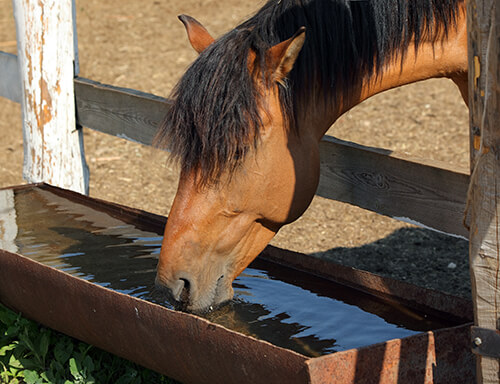Protecting Horses from Dehydration
Oct 07, 2019

As the temperature continues to stay high, often times so does the chance of your horse becoming dehydrated, particularly if you are working them. A mature, healthy horse will need to consume daily, on average, 1 gallon of water per 100 pounds of body weight. Water intake plays an especially important role in maintaining gastrointestinal health and motility. Without adequate water intake, horses are at greater risk for choke and impaction colic.
When it comes to water intake, what your horses graze matters. The moisture content of fresh pasture is typically 75-80 percent. At that level of moisture, horses are obtaining as much as 8-15 gallons of water a day through grazing. Hay, on the other hand, is typically 10-12% moisture, and contributes less than half a gallon of water per day, which means horses being fed hay must drink more fluid water to meet their daily water requirements and remain hydrated.
When it comes to helping horses maintain adequate water intake, it is important to keep water temperature in mind. The ideal water temperature for horses is 45-65°F, and it is important to keep the water fresh and clean. Owners should also monitor water consumption. It is critical to know what your horse typically drinks so that you know what is abnormal.
Soaking feedstuffs is one of the only ways to increase the moisture content of a horse’s diet. This works well for senior horse feeds, beet pulp, or hay cubes. Because of dental issues, senior horses often do not adequately chew their feeds, and paired with reduced saliva production due to aging means the risk of choke or impaction colic increases dramatically. For that reason, soaking feeds can be of benefit, however, it should not replace an adequate water supply.
These are just a few simple tips to help prevent your horse from dehydration. Head to your local Co-op for all your horse care needs!
When it comes to water intake, what your horses graze matters. The moisture content of fresh pasture is typically 75-80 percent. At that level of moisture, horses are obtaining as much as 8-15 gallons of water a day through grazing. Hay, on the other hand, is typically 10-12% moisture, and contributes less than half a gallon of water per day, which means horses being fed hay must drink more fluid water to meet their daily water requirements and remain hydrated.
When it comes to helping horses maintain adequate water intake, it is important to keep water temperature in mind. The ideal water temperature for horses is 45-65°F, and it is important to keep the water fresh and clean. Owners should also monitor water consumption. It is critical to know what your horse typically drinks so that you know what is abnormal.
Soaking feedstuffs is one of the only ways to increase the moisture content of a horse’s diet. This works well for senior horse feeds, beet pulp, or hay cubes. Because of dental issues, senior horses often do not adequately chew their feeds, and paired with reduced saliva production due to aging means the risk of choke or impaction colic increases dramatically. For that reason, soaking feeds can be of benefit, however, it should not replace an adequate water supply.
These are just a few simple tips to help prevent your horse from dehydration. Head to your local Co-op for all your horse care needs!